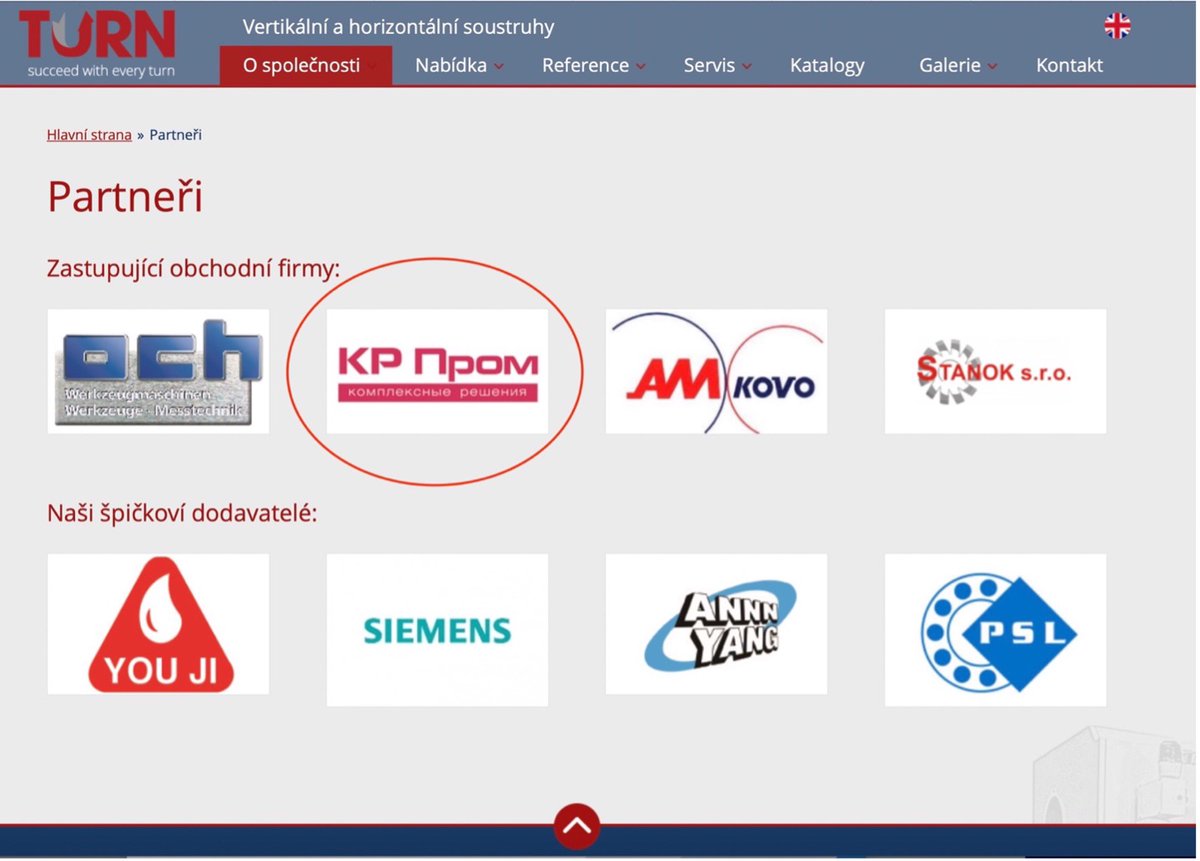Czech manufacturer TDZ Turn posted this hilarious public statement on their website. They were triggered because Yale researchers led by @JeffSonnenfeld included them into the list of Western companies continuing to operate in Russia.
TDZ Turn seem to be really scared. Why?🧵
TDZ Turn seem to be really scared. Why?🧵

We never operated in Russia directly. We do not have business contacts there. After annexation of Crimea we limited our operations to the minimum and (God forbid!) didn't work with sanctioned companies
Our conscience is clear. Unlike that of the American Yale University
Our conscience is clear. Unlike that of the American Yale University

Why is TDZ Turn so triggered? Well, because they helped to build the Russian nuclear arsenal. Russian ICBM and SLBM production is concentrated in Roskosmos megaholding or more specifically in its two sub-holdings:
1) JSC MITT (solid-propellant)
2) JSC Makeyev (liquid-propellant)
1) JSC MITT (solid-propellant)
2) JSC Makeyev (liquid-propellant)

JSC Krasnoyarsk Machine Building Plant (Krasmash) is the key manufacturer of missiles within the JSC Makeyev Design Bureau Structure. Basically it is *the* bottleneck in Russian liquid propellant ballistic missiles production, such as the SLBM Sineva or ICBM Sarmat 

Russian administrative culture is anniversary-centric. Ridiculously obsessed with all kinds of anniversaries. Let's open a video on the👏84th👏anniversary👏of👏 the👏Krasmash👏broadcasted on a regional TV channel "Yenisey" in 2016.
On 3:00 you see this

On 3:00 you see this

This is a VLC 4000 ATC + C1 vertical lathe produced (who could've thought?) by the TDZ Turn company. Check out their brochure google.co.uk/url?sa=t&rct=j… 

How could a Russian nuclear weapons delivery systems producing plant acquire a Czech machine? Trough the KR Prom (КР Пром) proxy company apparently. It looks like TDZ Turn deleted information about this partnership from their website by now. But I screenshoted it on June 27, 2022 

Let's formulate our research hypothesis. It looks like the Russian KR Prom company acted as a proxy for TDZ Turn. Technological import for the Russian ICMB/SLBM producing plant seems to have been organised in the following way
TDZ Turn -> KR Prom -> Krasmash
Now let's check it
TDZ Turn -> KR Prom -> Krasmash
Now let's check it

Let's check the KR Prom -> Krasmash connection first
Fortunately, we have a documental evidence. It is a protocol of the Krasmash procurement commission on purchase of spare parts for the metal-working machines from the KR Prom. January 29, 2018
Fortunately, we have a documental evidence. It is a protocol of the Krasmash procurement commission on purchase of spare parts for the metal-working machines from the KR Prom. January 29, 2018

Now let's check customs data to establish the TDZ Turn -> KR Prom connection
Voila, we see shipments of carousel lathe machining centres, CNC lathes, components for fixing the metal-cutting instruments. Starting in 2013 and finishing in 2019. Well after the annexation of Crimea
Voila, we see shipments of carousel lathe machining centres, CNC lathes, components for fixing the metal-cutting instruments. Starting in 2013 and finishing in 2019. Well after the annexation of Crimea

Interestingly enough, on June 27, 2022 when I did screenshoting, TDZ Turn openly recognised that main consumers of its machine tools are in Middle Europe and in Russia
In Russia = in Russian military industry. It consumes almost all of the industrial equipment in the country
In Russia = in Russian military industry. It consumes almost all of the industrial equipment in the country

According to Sergey Chemezov, CEO of the largest Russian defence megaholding Rostec, 84% of machine tools in Russia are consumed by the military industry. There are few other large consumers in Russia
Russian industrial equipment import almost fully goes for the military needs
Russian industrial equipment import almost fully goes for the military needs

This short article published in 2017 on a seemingly crappy website became a starting point for this research. NB: seemingly crappy websites may hide tons of valuable & uncensored data.
We won't stop here ofc, we'll go all the way down the rabbit hole
rusletter.com/articles/germa…
We won't stop here ofc, we'll go all the way down the rabbit hole
rusletter.com/articles/germa…

Actually I may have been unfair to Russian KR Prom calling it simply a TDZ Turn proxy. They're better than that
There is a major "domestic" Russian producer of machine tools ГРС Урал. Let's look up its ownership structure:
49% KR Prom (Russia)
51% TOS VARNSDORF (Czechia)
There is a major "domestic" Russian producer of machine tools ГРС Урал. Let's look up its ownership structure:
49% KR Prom (Russia)
51% TOS VARNSDORF (Czechia)

Let's return back to our 👏 Krasmash👏 84th👏 anniversary👏 video👏 .
2:29 The hell is this? This is the Czech-produced TOS Varnsdorf WRD 150 Q floor type horizontal boring machine. It is most probably imported
2:29 The hell is this? This is the Czech-produced TOS Varnsdorf WRD 150 Q floor type horizontal boring machine. It is most probably imported

And yet, Krasmash could've potentially "import substitute" this kind of equipment, switching to "domestic production". Because Czech TOS Varnsdorf localised its production on ГРС Урал. So these Czech machines count as Russian for legal and statistics purposes 

This raises some interesting questions. Wasn't Bloomberg too optimistic when it assessed Russian import dependency in machine tools at 70%? What do we even mean by Russian machine tools production? Does Russia even have it?
I'll guess we'll find out next time. The end of🧵
I'll guess we'll find out next time. The end of🧵
PS I think it's time to start giving cultural references to where I am taking my meme templates, etc. from
I think this guy from a Soviet cartoon "Caliph Stork" would perfectly represent TDZ Turn company and its values. Consider using him as your mascot
I think this guy from a Soviet cartoon "Caliph Stork" would perfectly represent TDZ Turn company and its values. Consider using him as your mascot
• • •
Missing some Tweet in this thread? You can try to
force a refresh





